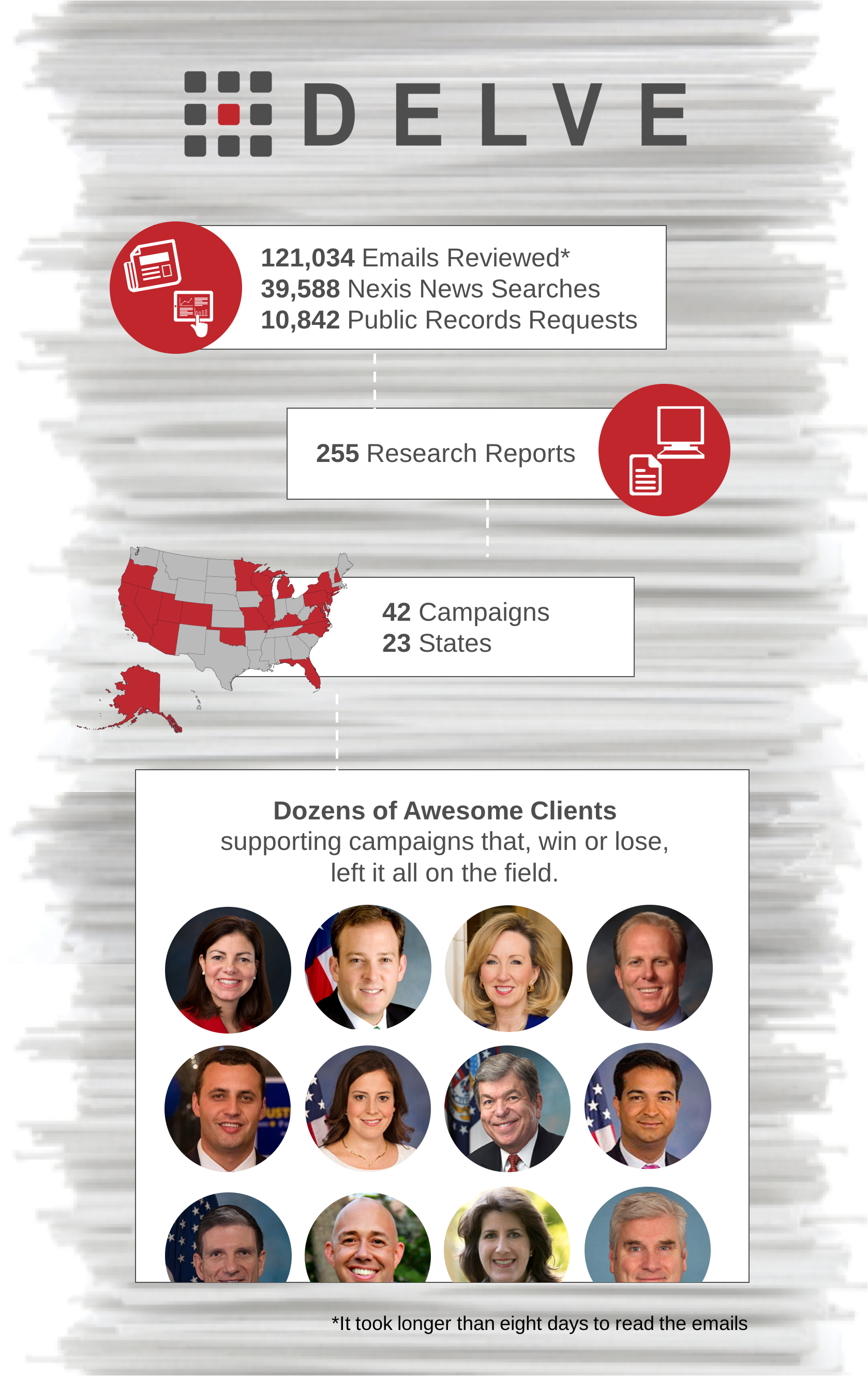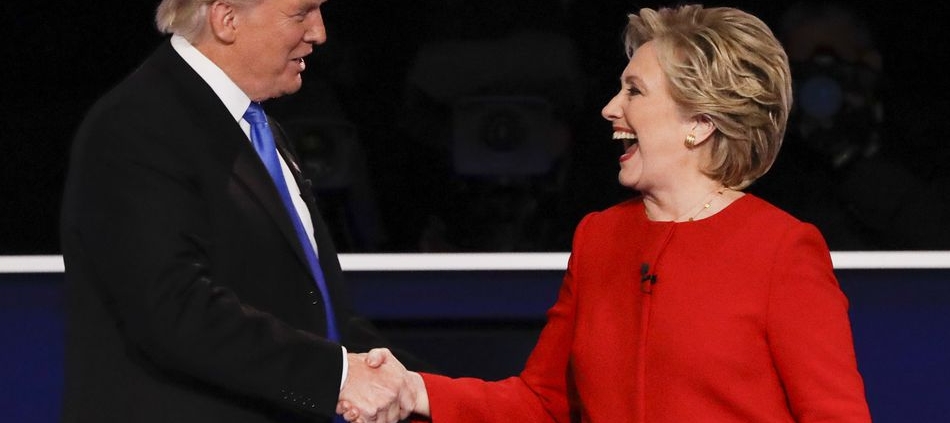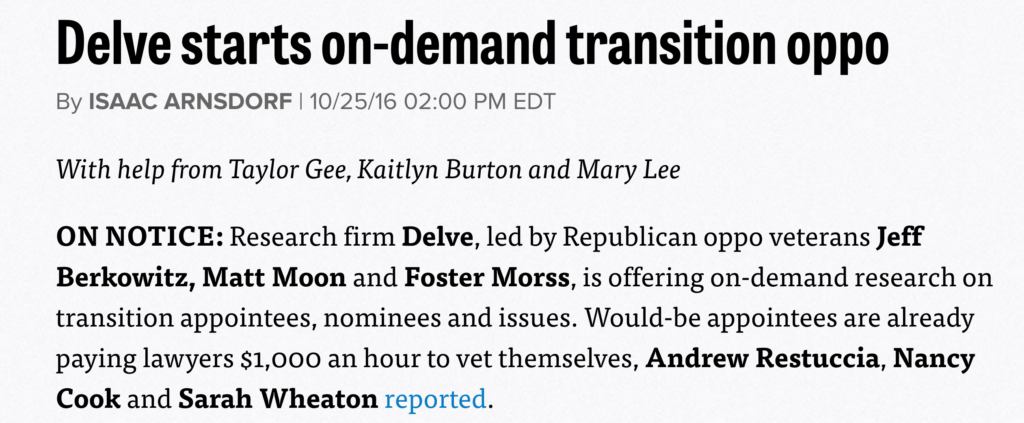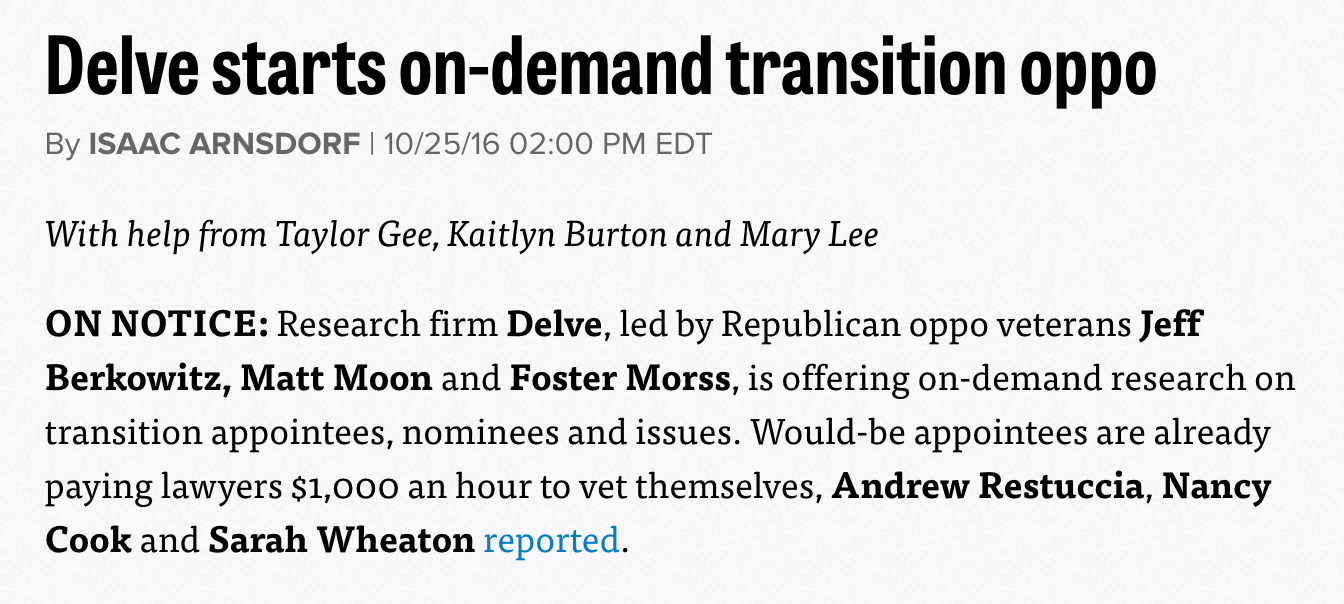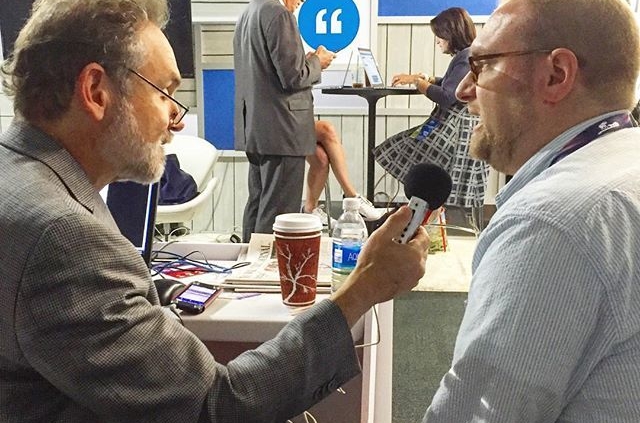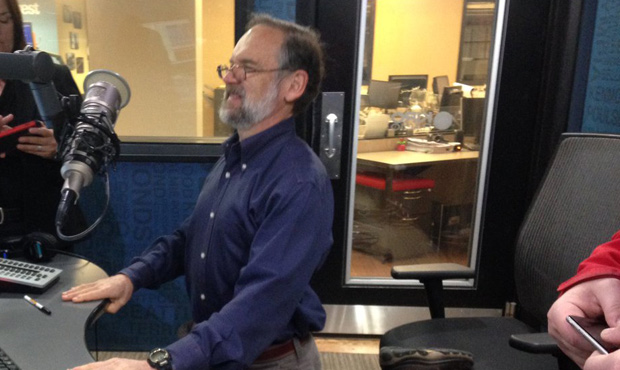The Administration Project: People Are Policy
How does the presidential transition work, who are the key players, and what do we know about them? Delve CEO Jeff Berkowitz went on the Tone and Tenor radio show to discuss Delve’s forthcoming research-on-demand service, The Administration Project, which will provide subscribers with an information advantage on the transition into the next presidential administration.
As Jeff said noted on the show, “It is often said in Washington that people are policy. Helping people understand who is coming in to the administration, what policy initiatives are being launched, tracking them, and helping [people] dig into those issues is really what we will be focusing on in The Administration Project.”
Jeff went on to share his insights into the current presidential transition teams:
“I think the Hillary Clinton administration is going to be much more predictable. There’s traditionally at least one member from the opposition party in the cabinet. George W. Bush retained Norm Mineta as Transportation Secretary who had been under the Clinton administration. Barack Obama kept Bob Gates as Secretary of Defense and appointed a republican to be Transportation Secretary…”
“…A Trump administration, I think, has a lot more potential for some surprises and intrigue. I think he’s going to want to bring people from the business world – successful CEOs, or former CEOs, and company chairmen – who can bring some of the business sense that he feels comfortable with into his administration. They speak his language on how to go about strategy and goals and meeting objectives that’s very different from the way government works. So it will be interesting to see how that plays out. I also think it will be interesting to see what role, people who are some of the most trusted advisors and folks he turns to, to execute on ideas, are his family members. Does Ivanka come into the administration? What role does Jared Kushner play?”
Why is this important? As Jeff explained, “[The next president will] transition into power and impact the next four or eight years of American life: our security, our prosperity, our culture. Helping folks understand what that means and what the implications are, we thought was important. Everyone is so focused on Election Day and what that means, that they aren’t necessarily thinking about what happens next. We decided to jump ahead and help people start thinking about what will happen after Election Day.”
Learn more about The Administration Project, and get your free copy of The Insider’s Guide to Forming the Next Administration, here.
Politico Influence Showcases Delve’s New Research-On-Demand Service
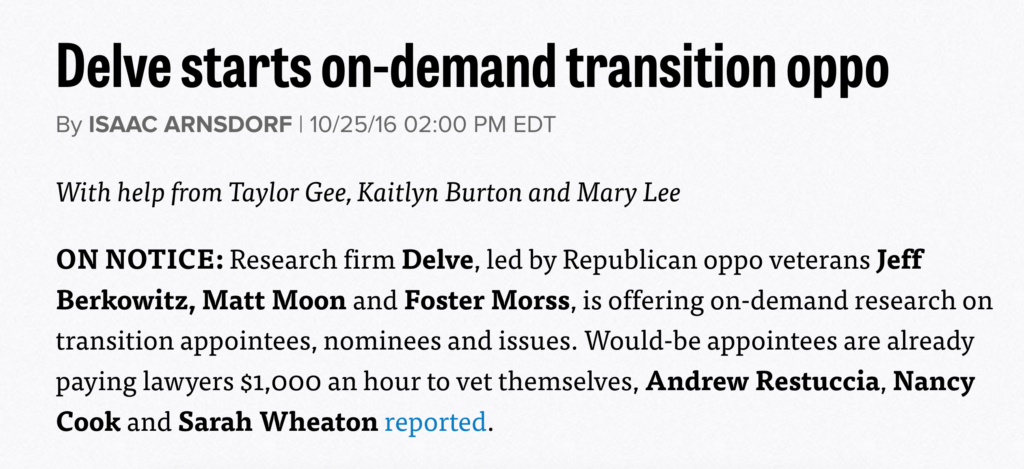
Did you know the next president will fill over 4,000 political appointments after Inauguration Day? Make sure you don’t miss a thing about the next administration. Sign up now to get access to The Administration Project, Delve’s new research-on-demand service for the presidential transition, reported in today’s Politico Influence.
George Soros’ Spending Power
On Saturday, Delve CEO Jeff Berkowitz joined KVOR 740 AM’s (Colorado Springs, CO) Jeff Crank to discuss the recent yet underreported document leak that reveals how billionaire George Soros uses his money to influence U.S. and European elections, fund smear campaigns against ideological opponents, pressure the Obama administration to alter their foreign policy, support anti-Israel propaganda, and even attempt to sway the U.S. Supreme Court.
Crank invited Berkowitz to join him on the show after our analysis from last week’s TL;DR on the Soros document dump caught his eye. TL;DR is Delve’s weekly take on under-the-radar stories and issues we think are worthy of your attention, along with the facts you need to engage on the key issues driving current policy and political debates.
Here is some of the analysis Berkowitz shared during the interview:
“[Soros] funded efforts to pressure the Obama Administration to increase the number of refugees that we took in this year up to 100,000, which is about 10 times what the administration had initially decided to take on. Given the concerns we’ve already seen raised against the vetting processes of those refugees both here and in Europe, that’s a grave concern to anyone concerned about the security of the country…”
“…[Soros’] financial interests and his ideological interests are very much aligned. He benefits from what I like to call political arbitrage. He looks at where there is going to be unrest, or disruptions, or economic downturns, and bets against those countries and gets a big windfall. He uses it to push his view of what he calls an open society, which is actually a very closed society…”
“…I would ultimately classify [Soros] as an oligarch: he believes that he knows better than most people, that most people need the state to take care of themselves, and the state should listen to people like him who understand all of the complexities of the world. An oligarch who believes in a fairly socialist state.”
As we noted in last week’s TL;DR, “Those involved in business and advocacy would benefit from looking at this story to see just how well-funded, large-scale operations seeking to influence an agenda are able to organize seemingly disconnected activists and groups through manipulation and funding. Learning about their strategies and tactics can better inform your own strategies and tactics.”
Listen to the full radio interview here:
Research Internship – Fall 2016
Click here for a pdf of this description.
Who We Are: Delve is a Competitive Intelligence and Issue Management firm specializing in deriving strategic insights from stakeholder, opposition, and policy research. Our clients include:
- Republican Political Campaigns
- Conservative Advocacy Groups
- Major Corporations
- Industry Groups / Trade Associations
Delve helps our clients achieve and leverage an information advantage over their opponents and other stakeholders in the political, policy and business challenges they face.
The Opportunity: Delve offers our interns a unique perspective of the world of politics and public affairs, as well as an opportunity to learn valuable skills from a knowledgeable and experienced team.
The work will be demanding, but interns who demonstrate they can handle these demands will have the opportunity for significant upward mobility within our firm or a strong recommendation from one of our well-connected leadership team members elsewhere in the political or policy world.
In addition to on-the-job training, this internship provides a monthly stipend and can be flexible to meet your school’s requirements for academic credit.
Who You Are: You are a driven undergraduate student whose insatiable curiosity drives them to dig deeper for information, ask tougher questions, and learn faster through experience. You are:
- Politically-attuned with experience in some sector of politics and public policy;
- A strong written communicator and thoughtful researcher;
- Detail oriented, collaborative, and more interested in getting the job done right than who gets credit;
- And committed to Republican Party principles and conservative activism.
Roles and Responsibilities: Our clients demand detailed, comprehensive, coherent, and 100% accurate research and analysis delivered at lightning speed. You will provide substantive support to our team of researchers while honing research and communications skills on top tier political campaigns and high-profile public affairs efforts. The responsibilities of this internship will include:
- Conducting research using a wide spectrum of research databases, public records requests, and other means of information gathering
- Offering assistance to team members by analyzing information and constructing narratives
- Monitoring news and social media for both internal and external projects
- Drafting reports and other client deliverables
- Providing limited administrative support (e.g., updating databases, maintaining project calendars, etc.)
Interested? Awesome! Email your resume to careers@delvedc.com. Briefly explain why you are interested in this opportunity in the text of your email. It does not have to be fancy or formal. If you have writing samples handy, feel free to include them. If not, there’s time for that later in the consideration process – we would rather hear from you sooner rather than later.
The Truth About Opposition Research
At the Republican National Convention in Cleveland, Delve CEO Jeff Berkowitz spoke to Jason Rantz of KIRO-TV’s (Seattle, WA) talk radio on the often misunderstood art of opposition research.
Jeff explained that the process will generally start with a vulnerability study, “so we can understand [a candidate’s] strengths and weaknesses as a candidate,” and what issues may exist in their past. He also pointed out that when preparing a candidate and their families for what kind of attacks may come their way, researchers will often be less careful with the facts to simulate how opponents could try to smear them.
The vulnerability study process at Delve is unique because instead of using big questionnaires or relying on a candidate’s memory of their own past for a framework of potential attacks, we dig into every facet of the public record exactly as an opponent’s researchers would. We use this research to build narratives that could be used, fairly or unfairly, by opponents. Our approach ensures candidates not only know the complete public record of their background but can back up the statements they and their campaign make about it and understand how their opponents might use – or misuse – the publicly available information.
Once campaigns begin digging into their opponents however, they need to be 100% accurate in every attack becomes crucial. Jeff talked about how this proved especially important when he prepared an attack on John Kerry for President Bush’s reelection campaign. Dispelling the common misconception of “oppo” as dumpster diving for personal attacks, Jeff explained, “it’s not just about this is a good person or a bad person, it’s also about you’re going to choose them to represent you, where do they stand on the issues.”
Check out the full interview below for a more in depth breakdown of modern opposition research and it’s being used.
Ross Files on KIRO-TV (Seattle, WA)
Delve CEO Jeff Berkowitz on “Ross Files” speaking from the RNC on the importance of sticking to the facts in political attacks.
DNC Convention Preview: What’s Hillary’s Message?
This is the fourth and final analysis in a series of insights we’ve provided on different policy platform fights and other issues in the weeks leading up to the Republican and Democratic National Conventions.
Here’s What You Need To Know
All eyes are on Donald Trump’s nomination acceptance speech tonight. But we want to be the first to look ahead to next week’s Democratic National Convention and some unanswered questions the Democratic Party faces. The Clinton campaign has taken a decidedly sharp left turn on several issues with Democrats about to adopt their most liberal platform ever. They have adopted severe limits on natural gas production, an expansion of Obamacare with a so-called “public option,” and a call for a constitutional amendment to overturn the Citizens United Supreme Court decision. On other issues, like trade, the Clinton campaign has decided not to stray as far as Bernie Sanders would have liked her to.
But voters still place economic and national security issues at or near the top of their priority list, and there are fundamental questions on how the Clinton campaign will choose to address these topics at next week’s Democratic National Convention in Philadelphia.
- What’s Hillary’s Theme? There’s no doubt that Donald Trump’s personality and his unconventional campaign tactics helped him win the Republican nomination. Yet his success also reflects his strategy of tapping into a theme that connects with Americans across the board: “Make America Great Again.” Meanwhile Hillary Clinton has campaigned under a banner of “I’m with her.” She has an agenda, but her campaign, like her slogan, has been all about Hillary Clinton, with no clear theme or message tying that agenda together. Will she use the Democratic National Convention to offer such a vision or will she stick to talking about what would be her “historic” election and depend on being the “anti-Trump”?
- What’s Hillary’s Message On The Economy? As Delve Executive Vice President Matt Moon mentioned in a Medium post last month, “Clinton has placed her bets on President Obama’s personal popularity and his economic record” but must court “both ‘Bernie or Bust’ voters and ticket-splitting independents, both of whom are unhappy with the economy.” Many of the far-left positions Clinton has taken on taxes, energy, and health care are all subject to criticism for harming economic growth and job creation. How Clinton tries to square her agenda with the electorate’s number one issue of concern could be an impossible mission.
- What’s Hillary’s Message On National Security? Promoting one’s foreign policy experience as events here and around the world showcase chaos and instability is like forcing a square peg into a round hole. According to a recent Suffolk University poll, nearly 54% of Americans feel less safe than they did 5-10 years ago. Yet we have heard very little from Hillary Clinton on how she would approach ISIS, global terrorism, and other national security issues. She could choose to continue to avoid this topic Americans care about deeply or surprise us with a national security message that will have to maneuver around her own record.
Conventions are used to “re-introduce” candidates and push narratives that will be used throughout the rest of the summer and fall as more Americans – especially undecided voters – start paying attention to the election. How Hillary Clinton uses next week’s convention will be a clear signal on both whether and how her campaign approaches the issues voters care about the most.
News You Can Use
With Hillary Clinton announcing her Vice Presidential running mate any day now, we looked at the likely candidates and found how many times they appeared in major media publications along with the terms “Hillary Clinton” and “Vice President” over the past three months. The results:
- Sen. Elizabeth Warren: 2,977 articles
- Sen. Tim Kaine: 1,202 articles
- Sen. Sherrod Brown: 846 articles
- HUD Secretary Julian Castro: 769 articles
- Sen. Cory Booker: 654 articles
- Agriculture Secretary Tom Vilsack: 124 articles
Press mentions are just one of a host of factors to consider when guessing who Clinton may pick, but DC is certainly a place known to react to what is heard throughout its own echo chamber.
BIG SOFTWARE
Major industrial conglomerates like the multinational corporations that make up Big Pharma all had to start somewhere. And most of them began as startups between 1849 and 1901. Wired recently wrote that we could be seeing the birth of “Big Software,” with companies like Google, Amazon, and Apple similarly dominating their industry for the next century. Despite the negative connotation of conglomerates, they have had profoundly positive impacts on industries that thrive on innovation. They also provide an existing corporate structure to innovators, allowing great ideas to be fast tracked instead of forcing creators to start their own company. How future policymakers at the federal and state levels promote (or stymie) these conglomerates will be key to how much growth they provide to our economy.
HYPOCRISY, THY NAME IS DSCC
Several Democratic candidates in key U.S. Senate races are taking advantage of massive loopholes in the federal laws regulating coordination with super PACs by posting instructions for these outside groups on everything from messaging to which media markets to target. While the campaigns and super PACs are technically not allowed to communicate with each other, posting these messages publicly on their websites makes it legally permissible. All this while the Democratic Party standard bearer, Hillary Clinton, has publicly called for a constitutional amendment overturning the U.S. Supreme Court’s Citizens United ruling creating super PACs.
KREMLIN DISINFORMATION COOKBOOK
The East Stratcom Task Force, an organization set up in 2015 to combat Russian disinformation campaigns throughout Europe, recently released a new video outlining the Kremlin’s propaganda strategies in countries like Armenia, Azerbaijan, Belarus, Georgia, Moldova, and Ukraine. The strategy breaks down the steps into rehashing and manipulating old content, propping it up with a questionable “expert,” then using a dubious western media sources to cement the claims’ legitimacy. The video is just the latest in the group’s ongoing efforts to push back against pro-Kremlin news in the EU and its eastern partner countries.
THE COSTS OF CLINTON UNIVERSITY
Experts now say Hillary Clinton’s plan to allow most Americans to attend public universities at no cost may have the opposite of its intended effect and drive tuition higher. As the past several decades of expanded federal tuition subsidies and subsequent increases in college tuition have shown, universities simply readjust their prices to take into account what the government is willing to pay them for students’ education. The impact of the tuition increases that would occur under Clinton’s plan wouldn’t only hit students and their families; it would be hit the federal government, and thus every taxpayer in America.
SHOULD WE LEARN TO LOVE BIG BANKS?
Recent bank earnings reports show four of America’s largest banks – Wells Fargo, JPMorgan Chase, Citigroup, and Bank of America – are lending at higher rates than three months ago. Fortune’s Chris Matthews says these figures should throw doubt on rhetoric from big bank “haters” because, “lending by private banks is more important to the real economy than policy changes at the Federal Reserve … because all Federal Reserve policy works through big banks before it makes it’s was to the broader economy.” With monetary policy having a limited impact, policymakers focused on pro-growth policies could start looking at ways to boost bank lending because, as Matthews points out, “that money is going to real people and business and is getting spent in the real economy.”
LONDON BANKS’ BREXIT PLAN
A recently leaked Deutsche Bank briefing document listed where the bank and its competitors may look to move their EU operations in response to Brexit. These banks’ London branches offer them access to the EU single market of 28 nations. But once the UK exits the EU, that so-called “bank passport” will expire. The confidential briefing clearly shows major banks are fully prepared for a post-Brexit world and their potential new EU homes like Ireland, France, Germany, and Luxembourg may stand to gain from the UK’s loss.
SYSTEM UPGRADE FOR FOIA? NO THANKS!
A new lawsuit against the FBI alleges the agency is deliberately using antiquated technology to slow down their responses to Freedom of Information Act (FOIA) requests. An MIT researcher who has been studying federal FOIA compliance claims that the FBI specifically conducts FOIA searches using the “universal index” portion of their legacy Automated Case Support system, which was originally deployed in 1995. This tactic is just another way federal agencies can legally obstruct FOIA requests to limit or delay access to information they would rather not share.
A $20 MILLION SEAT
Recently filed campaign finance reports show the second-place finisher in the Democratic primary for Maryland’s 8th congressional district, David Trone, spent more than $13.32 million on his campaign. The nine-way primary came in as the most expensive House race in the country thus far in the 2016 election cycle, with the candidates spending a combined $19.6 million. Trone’s campaign outspent the winner by over $11 million, with Democratic nominee State Sen. Jamie Raskin’s campaign spending topping out at $1.9 million. It’s just further proof that money alone doesn’t buy elections.
Mark Your Calendars
Monday, July 25 – Thursday, July 28: Democratic National Convention in Philadelphia
Berkowitz on KMIZ-TV (Columbia, MO) News at the RNC
Delve CEO Jeff Berkowitz speaking with KMIZ-TV (Columbia, MO) at the RNC in Cleveland: “America has to be strong for the world to be safe.”
Watch the full clip here:
